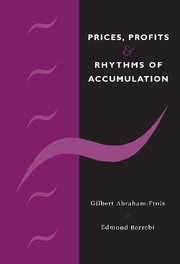Book contents
- Frontmatter
- Contents
- Preface
- 1 The golden rule of accumulation and prices
- 2 Systems of production prices
- 3 Irregular and decomposable systems
- 4 The analysis of joint production
- 5 Standards and blocking goods
- 6 Labour values and the problem of transformation
- 7 Switch in methods of production
- 8 The dynamic evolution
- Notes
- References
- Index
2 - Systems of production prices
Published online by Cambridge University Press: 06 July 2010
- Frontmatter
- Contents
- Preface
- 1 The golden rule of accumulation and prices
- 2 Systems of production prices
- 3 Irregular and decomposable systems
- 4 The analysis of joint production
- 5 Standards and blocking goods
- 6 Labour values and the problem of transformation
- 7 Switch in methods of production
- 8 The dynamic evolution
- Notes
- References
- Index
Summary
In this chapter we shall examine the problem of the determination of prices following Sraffa's (1960) approach in Production of Commodities by Means of Commodities. We will first contemplate the problem of the determination of prices in a case of production for subsistence, a world of robots where there is no final consumption. There is no surplus, and prices which make it possible for the production process to be repeated spring directly from the methods of production. In a sense, we have here pure production prices. As soon as the economic system produces more than the minimum that is necessary to replace what was used up for production, the exchange values cannot be determined as in the previous case: there is a fundamental interaction between prices and distributive variables. The notion of‘wageprices’ will allow us to specify the relationship between wage and profit, the form of which depends on the numeraire chosen to evaluate prices and wages. After we will show that production prices may be considered as dated quantities of labour (this is the problem of ‘reduction’) and that we can easily shift from the hypothesis of wages as a share of surplus to the hypothesis of ‘advanced’ wages.
Our framework of analysis here is simple production with specialised activities, while industry systems under joint production are developed in chapter 4. Finally, since irregular decomposable systems are addressed in detail in chapter 3, we shall limit the analysis of the present chapter to regular indecomposable systems.
- Type
- Chapter
- Information
- Prices, Profits and Rhythms of Accumulation , pp. 39 - 58Publisher: Cambridge University PressPrint publication year: 1997



